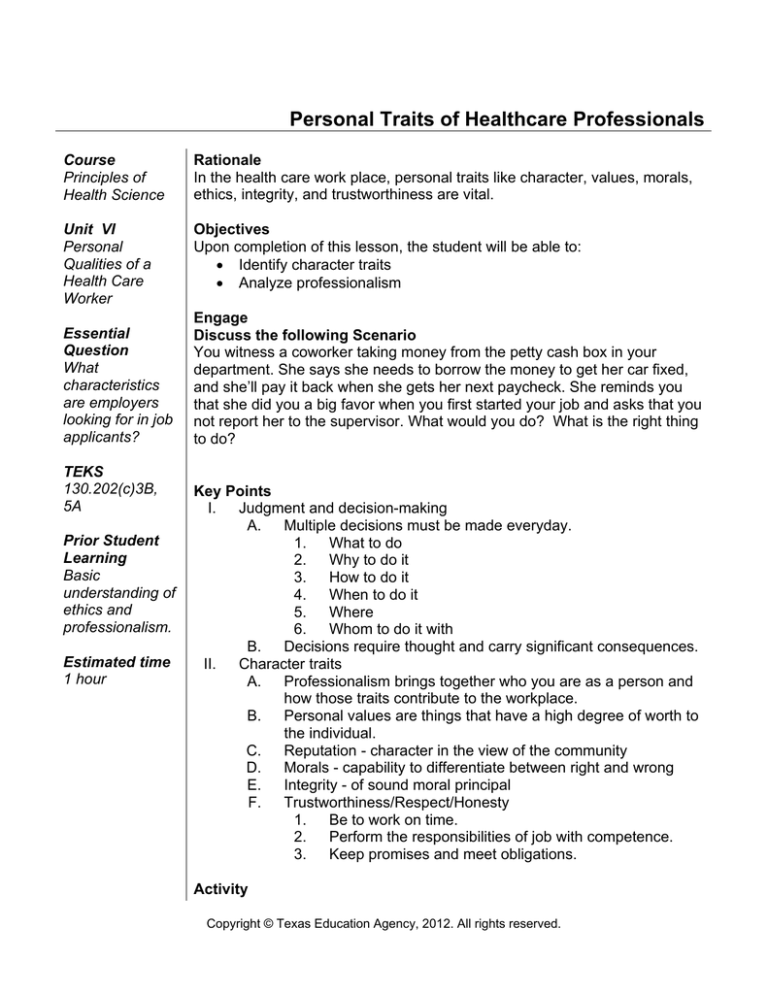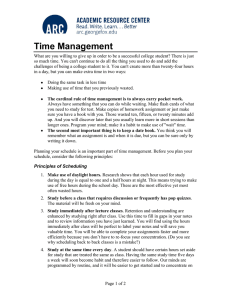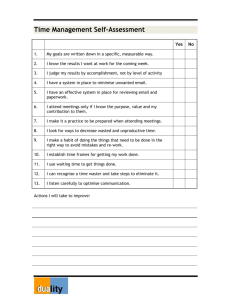Personal Traits of Healthcare Professionals
advertisement

Personal Traits of Healthcare Professionals Course Principles of Health Science Rationale In the health care work place, personal traits like character, values, morals, ethics, integrity, and trustworthiness are vital. Unit VI Personal Qualities of a Health Care Worker Objectives Upon completion of this lesson, the student will be able to: Identify character traits Analyze professionalism Essential Question What characteristics are employers looking for in job applicants? TEKS 130.202(c)3B, 5A Prior Student Learning Basic understanding of ethics and professionalism. Estimated time 1 hour Engage Discuss the following Scenario You witness a coworker taking money from the petty cash box in your department. She says she needs to borrow the money to get her car fixed, and she’ll pay it back when she gets her next paycheck. She reminds you that she did you a big favor when you first started your job and asks that you not report her to the supervisor. What would you do? What is the right thing to do? Key Points I. Judgment and decision-making A. Multiple decisions must be made everyday. 1. What to do 2. Why to do it 3. How to do it 4. When to do it 5. Where 6. Whom to do it with B. Decisions require thought and carry significant consequences. II. Character traits A. Professionalism brings together who you are as a person and how those traits contribute to the workplace. B. Personal values are things that have a high degree of worth to the individual. C. Reputation - character in the view of the community D. Morals - capability to differentiate between right and wrong E. Integrity - of sound moral principal F. Trustworthiness/Respect/Honesty 1. Be to work on time. 2. Perform the responsibilities of job with competence. 3. Keep promises and meet obligations. Activity Copyright © Texas Education Agency, 2012. All rights reserved. I. Divide students into groups of 4 or 5. Each group will discuss and develop answers to What If Scenarios and present findings to class. II. Complete the Wasted Time activity. Assessment Completion of What If Scenarios. Key – Wasted Time Materials Textbook-The Healthcare Worker’s Primer on Professionalism by Sherry Makely ISBN 0835954838 Accommodations for Learning Differences For reinforcement, the student will outline the professional traits of a character in a movie, book or television program. For enrichment, the student will research newspaper/journal articles documenting a breach in professionalism. Report findings. National and State Education Standards National Health Science Cluster Standards HLC08.01 Ethics and Legal Responsibilities Health care workers will understand the legal responsibilities, limitations, and implications of their actions within the health care delivery setting. HLC08.02 Ethics and Legal Responsibilities Health care workers will understand accepted ethical practices with respect to cultural, social, and ethnic differences within the health care environment. They will perform quality health care delivery. TEKS 130.202(c)3(B) demonstrate leadership skills, characteristics, and responsibilities of leaders such as goal setting and team building; and 130.202(c)5(A) identify employer expectations such as punctuality, attendance, time management, communication, organizational skills, and productive work habits; Texas College and Career Readiness Standards CROSS-DISCIPLINARY STANDARDS I. Key Cognitive Skills A. Intellectual curiosity 1. Engage in scholarly inquiry and dialogue. 2. Accept constructive criticism and revise personal views when valid evidence warrants. B. Reasoning 1. Consider arguments and conclusions of self and others. 2. Construct well-reasoned arguments to explain phenomena, validate Copyright © Texas Education Agency, 2012. All rights reserved. conjectures, or support positions. 3. Gather evidence to support arguments, findings, or lines of reasoning. 4. Support or modify claims based on the results of an inquiry. C. Problem solving 1. Analyze a situation to identify a problem to be solved. 2. Develop and apply multiple strategies to solving a problem. 3. Collect evidence and data systematically and directly relate to solving a problem. D. Academic behaviors 1. Self-monitor learning needs and seek assistance when needed. 2. Use study habits necessary to manage academic pursuits and requirements. 3. Strive for accuracy and precision. 4. Persevere to complete and master tasks. E. Work habits 2. Work collaboratively. F. Academic integrity 1. Attribute ideas and information to source materials and people. 2. Evaluate sources for quality of content, validity, credibility, and relevance. 3. Include the ideas of others and the complexities of the debate, issue, or problem. 4. Understand and adhere to ethical codes of conduct. Copyright © Texas Education Agency, 2012. All rights reserved. What If Scenarios What would you do in the following situations? 1. You need to have your time card signed by the end of the day. You know your supervisor would sign it, but she’s tied up in a meeting and your shift ends in 10 minutes. 2. You have one more paper to turn in for a course that is required for your job. You kept the weekend open to write it, but an old friend called and said he’s in town for the weekend and would like to spend some time with you. You know there won’t be enough time both to write the paper and to visit with your friend. You just happen to have a copy of a paper that someone else wrote for the same course two years ago that earned a grade of “B.” A new instructor who would never know you didn’t write the paper yourself is teaching the course. 3. Your supervisor asked you to attend a meeting in her place, but you forgot to go. You know she’ll be upset with you because she needs the information that was distributed. Someone else you know did go to the meeting and has agreed to give you copies of the materials. When you hand the information to your supervisor, she asks, “So what did you think of the meeting?” 4. A patient on your unit gets discharged. While cleaning the room for the next patient, you find an expensive watch in the drawer in the bedside table. It’s a woman’s watch and the former patient was a man. 5. When you open your paycheck, you realize you got paid for a day that you didn’t work. 6. You’d like to call your sister in Maine, but can’t afford the long-distance phone charge. The phone in the break room has long-distance access, and other workers have used it for personal calls without being questioned. Copyright © Texas Education Agency, 2012. All rights reserved. 7. As a research assistant, your salary and the project you’re involved in are funded by a federal grant. If the results of the research are positive, the grant and your job will get renewed for another year. The director of the research project asks you to help him change some of the data to indicate better results. 8. When it’s time for your annual competency evaluation, your supervisor announces that you and your coworkers will be checking each other off. Your coworkers get together and decide just to give each other a satisfactory evaluation without actually checking each person’s competency level. Copyright © Texas Education Agency, 2012. All rights reserved. Wasted Time - Key Calculate how much it would cost a company if a worker is paid $8.00 an hour, works five days a week, and comes in 15 minutes late each day. 1. How many minutes per week are wasted? 15 minutes x 5 days = _______ minutes wasted per week. 75 minutes 2. How many minutes per month are wasted? _______ minutes per week x 4 weeks = _______ minutes wasted per month. 300 minutes 3. How many hours are wasted in one month? _______ minutes per month / 60 minutes = _______ hours wasted per month. 5 hours 4. How much money does the company lose each month in wasted time with that one worker? _______ hours wasted per month x $8.00 per hour = $_______ lost per month. $40.00 5. How much money does the company lose in a year in wasted time with one worker? $_______ wasted per month x 12 months = $_______ lost per year. $480.00 Note: 60 minutes = 1 hour 4 weeks = 1 month 12 months = 1 year Copyright © Texas Education Agency, 2012. All rights reserved. Wasted Time Calculate how much it would cost a company if a worker is paid $8.00 an hour, works five days a week, and comes in 15 minutes late each day. 1. How many minutes per week are wasted? 15 minutes x 5 days = _______ minutes wasted per week. 2. How many minutes per month are wasted? _______ minutes per week x 4 weeks = _______ minutes wasted per month. 3. How many hours are wasted in one month? _______ minutes per month /60 minutes = _______ hours wasted per month. 4. How much money does the company lose each month in wasted time with that one worker? _______ hours wasted per month x $5.15 per hour = $_______ lost per month. 5. How much money does the company lose in a year in wasted time with one worker? $_______ wasted per month x 12 months = $_______ lost per year. Note: 60 minutes = 1 hour 4 weeks = 1 month 12 months = 1 year Copyright © Texas Education Agency, 2012. All rights reserved.





